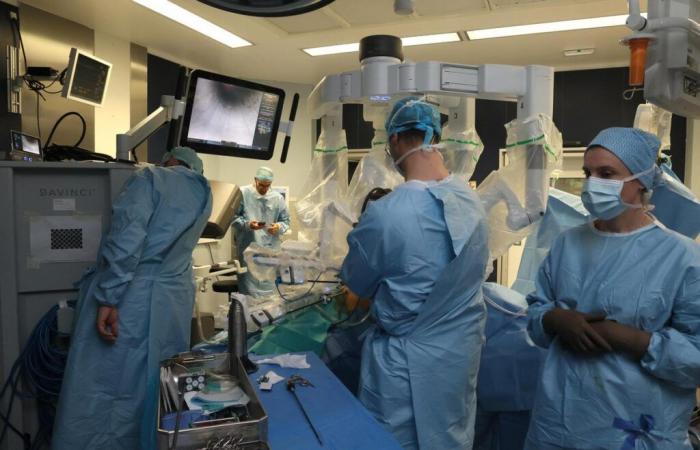
Jean-Emmanuel Bibault, doctor-oncologist at the Georges-Pompidou hospital in Paris, carries out research at Inserm, around his obsession: artificial intelligence (AI). “Artificial intelligence and all the scientific advances it will generate is my field,” he begins. It will help us treat, create new drugs, and define innovative therapeutic strategies. But all this will only be done with men and women behind the tool. » He publishes a second work, written as a thriller, a scientific investigation “Cancer confidential” (Éditions Équateurs, €20)
Jean-Emmanuel Bibault, professor of radiotherapy oncology at the Georges hospital (Pompidou in Paris, is a researcher at Inserm. He published a first book in 2023 “The Odyssey of Medicine”, his next “Cancer confidential” is coming out in bookstores on January 15.
Studio Bontant
In your book you mention the first case of cancer detected by a paleo-oncologist, 1.7 million years ago. So cancer is not the disease of modern man?
This is a first false belief to correct, cancer has always existed, the disease is inherent to life. The first traces were observed in a dinosaur, and in a hominid, in fact, 1.7 million years ago. A paleo-oncologist analyzed, using a very advanced imaging technique, a trace of sarcoma on one of the bones of the foot.
When we say that the cause of cancer is linked to increased life expectancy, our lifestyles, tobacco, alcohol, sugar, etc., is that not entirely true?
Not only that. The explosion in the incidence of cancer is correlated with modern risk factors and aging, it is true, but the disease as such has always existed. In my book I show the evolution of cancer from ancient Egypt to the present day. How the disease was conceptualized, diagnosed, what were all the various therapy strategies.
What are the triggers of cancer, how and why does the body begin to malfunction?
The disease is characterized by different mechanisms, not yet all elucidated, which contribute to transforming normal cells into atypical cells, which will develop uncontrollably. Basically, at the beginning of the disease, the normal cell undergoes genetic changes and proliferates. The abnormal cells form a mass, with a strong metastatic power, i.e. the ability to spread to other parts of the body, a pernicious phenomenon. Not all cancers progress in the same way; their understanding is the key to the therapeutic revolution.
In the book you recount the case of the Queen of Austria, a victim of breast cancer. And the amazing therapies she underwent. An affair of state?
Yes, really. She benefited from the latest scientific innovations of the time, it was 1664… Her tumor was incised to insert pieces of meat supposed to divert the cancer from her body, it did not work. At the time, doctors put forward a parasitic theory. The queen is dead, but the understanding of cancer has advanced a little.
We have seen the emergence of targeted therapies, then immunotherapy, and AI which will be the conductor of the use of all therapeutic components.
“AI will be the conductor of the use of all therapeutic components”
What discoveries have made history and improved cancer care?
The main change dates from the 19the century, with the appearance of several forms of therapy. To begin surgery under anesthesia, the first step will be to remove the tumor, then radiotherapy will come at the end of the 19th century.e. The third pillar will be chemotherapy, discovered during the Second World War. The Nazis highlighted the environmental causes of cancer, excessive alcohol consumption, tobacco, pesticides. A strange paradox: they carried out actions that had a beneficial effect on public health, while advocating eugenic and racist ideas.
How can we explain the increase in cancers over the last twenty years, particularly among young people?
The explosion of cancers among young people between 30 and 40 years old, particularly colorectal cancers, is very worrying. Several avenues of understanding present themselves: diet, junk food, increased alcohol consumption, tobacco, sedentary lifestyle. Beyond that, the methods of preserving our food raise questions, the refrigerator is one of the hypotheses. Keeping food for too long is one of the theories explaining this phenomenon… Pollution of air, water and soil is now a risk factor.
In your opinion, there is hope of beating cancer. In what way?
After the rise of chemotherapy, we saw the emergence of targeted therapies, then immunotherapy, robotic surgery, Flash radiotherapy, vaccines, RNA… AI will be the conductor of the use of all therapeutic components. The treatments will be personalized, less invasive, advanced imaging will allow precise, tailored diagnoses.





